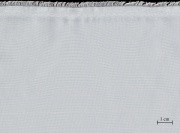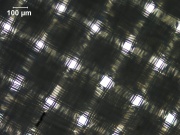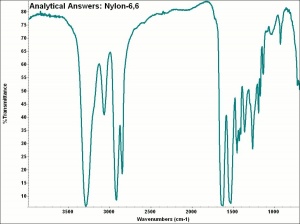Difference between revisions of "Nylon 6,6"
m (Text replace - "\[http:\/\/cameo\.mfa\.org\/materials\/fullrecord\.asp\?name=([^\s]+)\s(.*)\]" to "$2") |
|||
| Line 28: | Line 28: | ||
| 1.521; 1.547 | | 1.521; 1.547 | ||
|} | |} | ||
| − | |||
| − | |||
| − | |||
| − | |||
== Comparisons == | == Comparisons == | ||
[[media:download_file_70.pdf|Properties of Synthetic Fibers]] | [[media:download_file_70.pdf|Properties of Synthetic Fibers]] | ||
| − | |||
| − | |||
== Additional Images == | == Additional Images == | ||
| Line 46: | Line 40: | ||
File:67 Nylon66 200X pol.jpg|Nylon 6,6 | File:67 Nylon66 200X pol.jpg|Nylon 6,6 | ||
</gallery> | </gallery> | ||
| − | |||
== Sources Checked for Data in Record == | == Sources Checked for Data in Record == | ||
| Line 54: | Line 47: | ||
* Richard S. Lewis, ''Hawley's Condensed Chemical Dictionary'', Van Nostrand Reinhold, New York, 10th ed., 1993 | * Richard S. Lewis, ''Hawley's Condensed Chemical Dictionary'', Van Nostrand Reinhold, New York, 10th ed., 1993 | ||
| − | * Marjory L. Joseph, ''Introductory Textile Science'', Holt, Rinehart and Winston, Fort Worth, TX, 1986 | + | * Marjory L. Joseph, ''Introductory Textile Science'', Holt, Rinehart and Winston, Fort Worth, TX, 1986, p. 135. |
| − | * J.Gordon Cook, ''Handbook of Textile Fibres:II Man-made Fibres'', Merrow Publishing Co. , Durham, England | + | * J.Gordon Cook, ''Handbook of Textile Fibres:II Man-made Fibres'', Merrow Publishing Co., Durham, England |
* F. Kidd, ''Brushmaking Materials'', Bristish Brush Manufacturers, London, 1957 | * F. Kidd, ''Brushmaking Materials'', Bristish Brush Manufacturers, London, 1957 | ||
Revision as of 18:22, 20 May 2020
Description
A polymer formed from Hexamethylenediamine and Adipic acid. Nylon 6,6 was first made as a textile fiber in 1935 by W.H. Carothers at DuPont. It was originally given the name Fiber #66. Nylon 6,6 is very similar to Nylon 6. The Thermoplastic fibers are strong, tough, elastic, and have high gloss. They are extruded through a spinneret with a circular or trilobal cross section shape. Nylon monofilaments are used for brushes, surgical sutures, tennis strings, and fishing lines. Nylon 6,6 fibers are used for clothing, carpets, tire cords, conveyor belts, and brushes. They have excellent dyeability and are twice as durable as Cotton. Nylon is sometimes coated with plastic, such as vinyl, to produce thin, lightweight waterproof fabrics.
See Nylon fiber.
Synonyms and Related Terms
adipic nylon; Fiber #66; Antron® [DuPont]; Cantrece® [DuPont]; Durasoft [Solutia]; Stainmaster [DuPont]; Wear-Dated [Solutia]; Brulon 240 [ICI]; Brulon 244 [ICI]; Perlon T [made in Germany]
Other Properties
Resistant to alkalis and most organic solvents. Degraded by acids and phenol. Burns with yellow-orange flame and blue smoke; smells of burnt horn. Fibers are smooth with no striations. Cross section is circular or trilobal. Tenacity = 4.6-9.0 g/denier (dry); 4.0-7.7 (wet); Elongation = 19-40% (dry); 32-46% (wet); Moisture regain = 3.8-4.5% (dry)
| Melting Point | 250 |
|---|---|
| Density | 1.14 |
| Refractive Index | 1.521; 1.547 |
Comparisons
Properties of Synthetic Fibers
Additional Images
Sources Checked for Data in Record
- G.S.Brady, Materials Handbook, McGraw-Hill Book Co., New York, 1971 Comment: p. 553
- Richard S. Lewis, Hawley's Condensed Chemical Dictionary, Van Nostrand Reinhold, New York, 10th ed., 1993
- Marjory L. Joseph, Introductory Textile Science, Holt, Rinehart and Winston, Fort Worth, TX, 1986, p. 135.
- J.Gordon Cook, Handbook of Textile Fibres:II Man-made Fibres, Merrow Publishing Co., Durham, England
- F. Kidd, Brushmaking Materials, Bristish Brush Manufacturers, London, 1957
- Meredith Montague, contributed information, 1998
- Website address 1 Comment: www.nswpmith.com.au/historyofplastics.html





